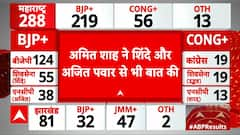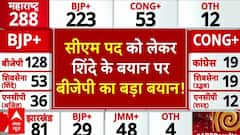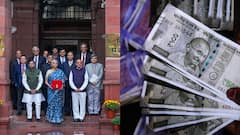(Source: ECI/ABP News/ABP Majha)
Union Budget 2024 India: Sensex, Nifty Take Big Hit As Govt Hikes Capital Gains Tax
Union Budget 2024 India: LTCG tax will increase from 10 per cent to 12.5 per cent, while the STCG tax on certain assets will rise from 15 per cent to 20 per cent, as per Sitharaman's Budget speech

Union Budget 2024 India: The two key equity benchmarks, Sensex and Nifty, slumped lower during the Budget presentation as Indian investors will need to allocate a larger chunk of their earnings to taxes as the government raises both short- and long-term capital gains taxes.
Finance Minister Nirmala Sitharaman, presenting her seventh Budget in Parliament on Tuesday, announced that the Long Term Capital Gains (LTCG) tax will increase from 10 per cent to 12.5 per cent, and the Short Term Capital Gains (STCG) tax on certain assets will rise from 15 per cent to 20 per cent.
Soon after this announcement by Sitharaman, the share market plunged sharply, as investors reacted to the capital gains tax hike, with the Sensex dropping over 1200 points.
At 1.30 pm, the BSE Sensex was trading below 80,000-mark at 79,859, falling 642 points. On the other hand, the NSE Nifty50 was trading at 24,301, down 208 points.
The government also proposed to raise the exemption limit on some financial assets to Rs 1.25 lakh per year, up from the previous limit of Rs 1 lakh on long-term equity gains.
Sitharaman said, "Listed financial assets held for more than a year and unlisted financial and non-financial assets held for two years are classified as long-term," she said. Unlisted bonds, debentures, debt mutual funds, and market-linked debentures will be taxed according to specific tax slabs, the FM stated.
Arpit Jain, Joint MD, Arihant Capital Markets Ltd, said the hike in securities transaction tax (STT) on F&O from 0.01 per cent to 0.02 per cent and long-term capital gains tax (LTCG) from 10 per cent to 12.5 per cent is definitely a negative for the investors.
"The street expected a level playing field for domestic and foreign investors by taxing the gains from equities for foreign institutions. Instead, LTCG was hiked which disappointed the market players. But the reduction in fiscal deficit estimate to 4.9 per cent from 5.1 per cent and target of 4.5 per cent for the next year is very good for the Indian economy in the long run. The 4.9 per cent fiscal deficit translates to borrowing target coming down to Rs 1.4 lakh-crore compared to the estimate of Rs 15.43 lakh crore for FY24.
While there will be some disappointment, we don’t believe it will deter people from investing in the Indian equities and the markets will normalise," Jain said.
Kranthi Bathini, Director, Equity Strategy, WealthMills Securities told ABP Live that the negativity came into the market due to the increase in in the short-term capital gains tax and long-term capital gains tax. However, Bathini gave a thumbs up to the Budget saying overall it’s a positive Budget.
Ankit Jain, Partner, Ved Jain & Associates, said long-term capital gains on securities were previously eliminated by the then Finance Minister when the government introduced the Securities Transaction Tax (STT) in its place. Now, investors have to deal with both the STT and capital gains tax, which seems like the government is reneging on its previous commitments, he said.
“Additionally, the Finance Minister did not announce any grandfathering of gains accumulated to date. This means the higher rate of 12.5 per cent will apply to all capital gains accrued over the years, not just those from now onward, effectively increasing an investor's tax burden by 20 per cent. I believe the government should act fairly and at least allow for grandfathering of capital gains accumulated so far,” Jain noted.
The government also proposed to merge the two tax exemption regimes for charities and reduce the tax deducted at source (TDS) rate on e-commerce from 1 per cent to 0.1 per cent. Additionally, the securities transaction tax (STT) on futures and options will be raised to 0.02 per cent and 0.1 per cent, respectively.
Top Headlines
Trending News







































